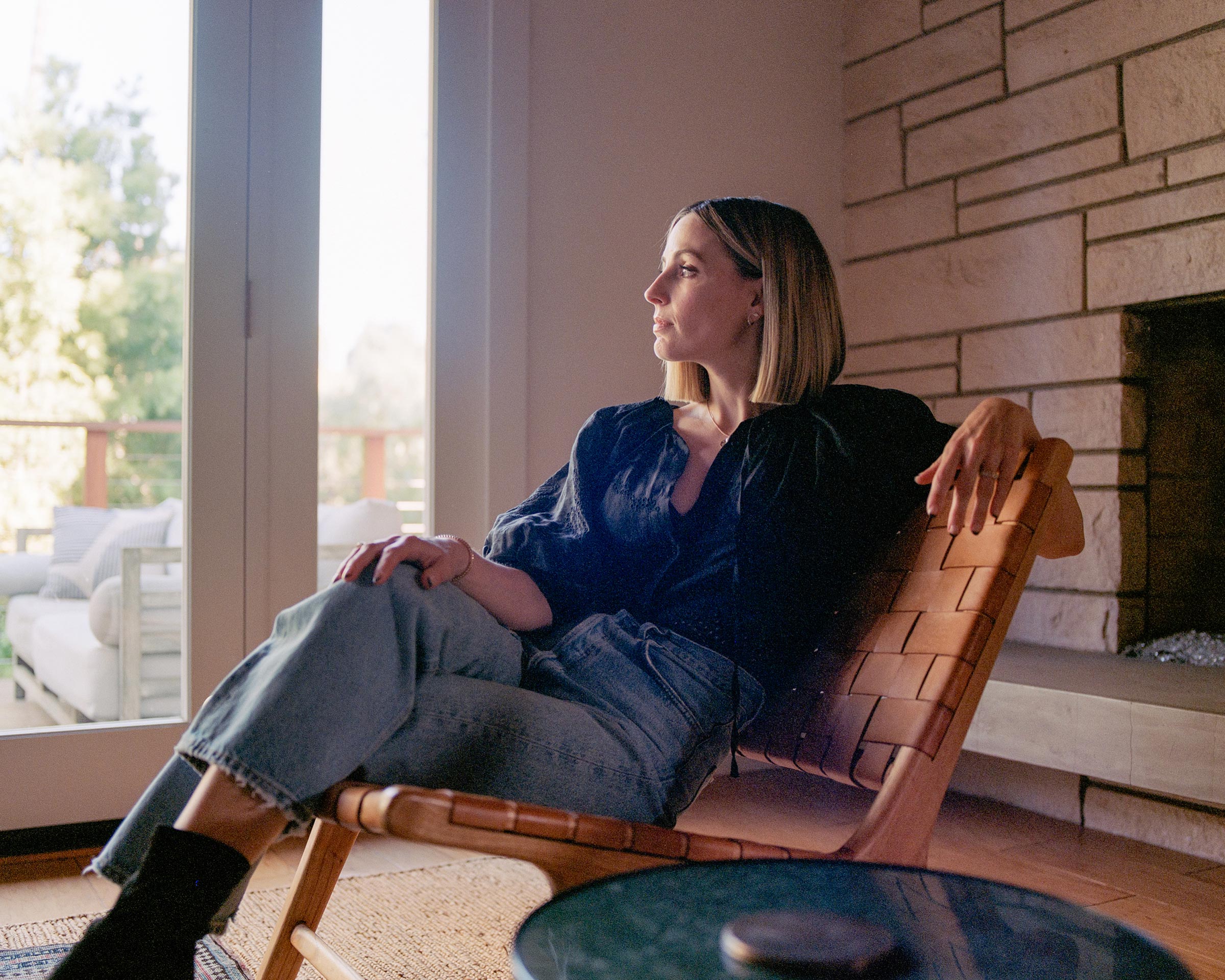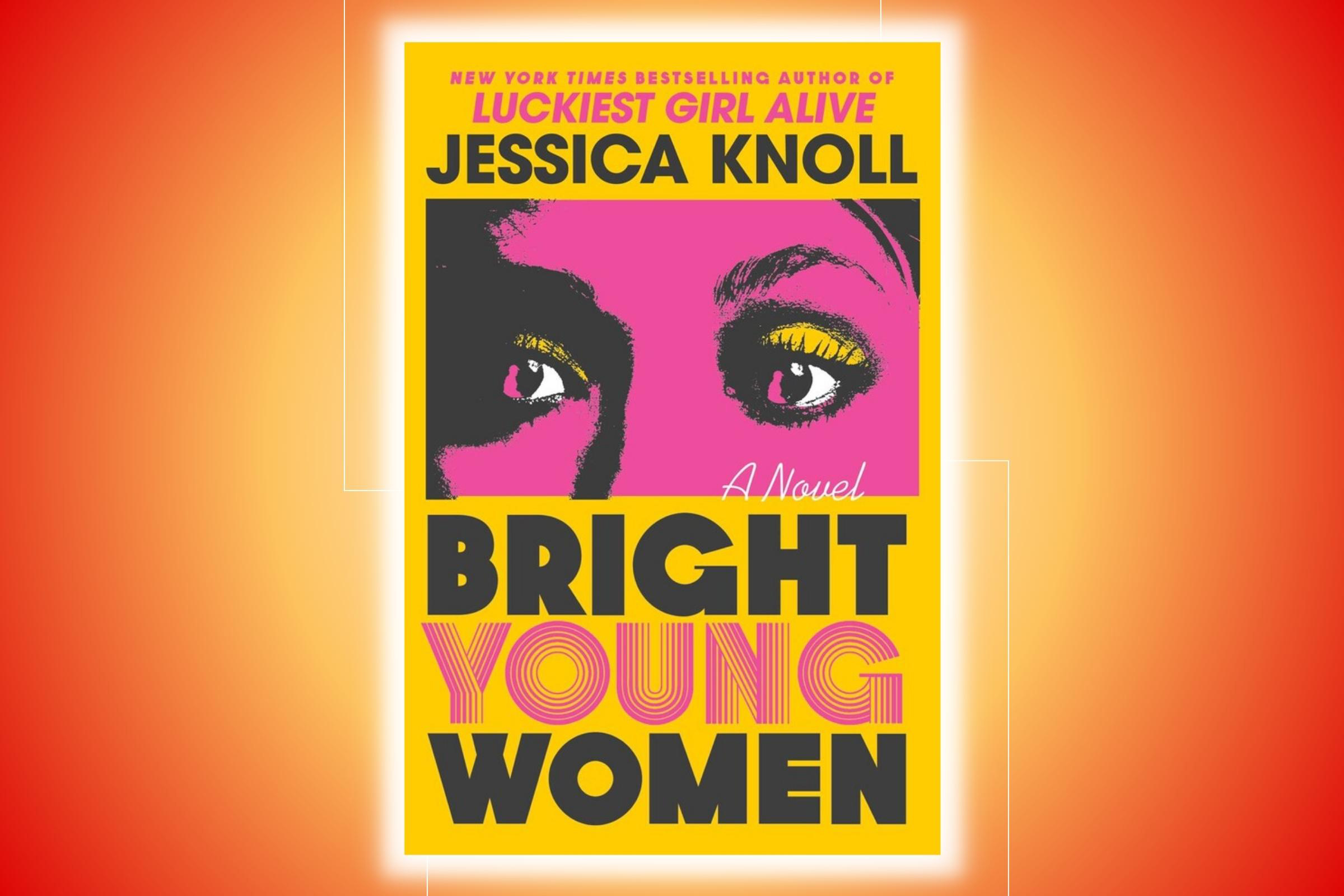
Success doesn’t look the same for novelist Jessica Knoll as it did five years ago. In 2018, the Luckiest Girl Alive author raised both cheers and eyebrows when she wrote an op-ed for the New York Times titled, “I Want to Be Rich and I’m Not Sorry.” That type of ambition may be the norm in finance or law, but in book publishing, where fiscal prosperity is elusive, artistic integrity is usually the professed goal.
“Can we just say the quiet part out loud?” Knoll, 39, asks over a matcha latte at New York City’s ModernHaus hotel. “Women want to be financially successful but also love what they do. It’s perfectly possible for these two things to coexist.” She knows writers are expected to be “precious” about their art. “I’ve been passionate about writing since I could hold a pen. But there’s a world where men make a lot of money doing this.” Knoll would like to profit too.
Luckiest Girl Alive, published in 2015, was a deeply personal book. It centers on a character who survives both a sexual assault and a school shooting, and the gang rape depicted in the novel was drawn from Knoll’s own experience being sexually assaulted by three boys at a party when she was 15. But Knoll also researched the publishing marketplace before starting the novel so she could capitalize on trends. It worked: she rode the wave of thrillers told from a female perspective that began with Gillian Flynn’s Gone Girl and spawned similarly-titled “girl” books like Paula Hawkins’ The Girl on the Train. After a bidding war, Knoll accepted an offer in the high six figures. Luckiest Girl Alive sold more than 1 million copies. Her second novel, 2018’s The Favorite Sister, also made best-seller lists.
But as Knoll prepares for her third novel, Bright Young Women, a thriller inspired by the survivors of Ted Bundy’s attacks, to publish on Sept. 19, she isn’t certain that her formula for commercial success can hold. “It’s been five years since my last book came out, and I don’t recognize the landscape anymore,” Knoll says. “We’re coming away from the domestic thriller space that was so hot for so long with Gillian Flynn and moving into Emily Henry and Colleen Hoover,” she says, referencing the rise of romance novels, which have flourished through word of mouth on TikTok.
More From TIME
Read More: The 36 Most Anticipated Books of Fall 2023
A lot has changed since Luckiest Girl Alive made Knoll a well-known author, including the setting where she’s chosen to meet. Nowadays this hotel’s vibe is Bauhaus-meets-greenhouse, with towering indoor trees shading modern banquettes. But Knoll remembers when it was called the James, and she partied here for her bachelorette back when she lived in New York. After Luckiest Girl Alive took off, Knoll moved to Los Angeles. "TV is where the money is," she wrote in the Times. She leveraged her interest in true crime—and its popularity in the mid-2010s—into two more book deals, a Netflix adaptation of Luckiest Girl Alive starring Mila Kunis, which debuted last fall, and a steady stream of screenwriting work for projects still in development. A stack of scripts she has been tasked with polishing are gathering dust on her desk while she waits for the WGA strike to end.
Knoll now knows that hits, whether on screen or in print, can’t be willfully engineered. She embraces that realization as a sign of personal growth. “If I tie my identity to something that’s subject to change at any time, who am I?” she muses. “It’s good for me to realize you’re never going to catch the marketplace, so just write the thing you can write.”
Knoll attended the private Shipley School in Bryn Mawr, outside of Philadelphia. She felt out of place among her wealthier high-school classmates. At one point a teacher called her a “cheap mallrat.” After Knoll was assaulted, someone scrawled “trash slut” on her locker—she, like so many survivors, was blamed and shamed. She decided success would be her revenge.
After graduating from Hobart and William Smith Colleges in Geneva, N.Y., Knoll spent five years as an editor at Cosmopolitan. But she dreamed of writing a novel that would become a phenomenon—that would show everyone back home. “For so long my identity was completely tied to how successful I was,” she says, “in large part because of pains from childhood.”
Pain is woven into Knoll’s work, and she writes about it without flinching. Poised yet intense, she does not hedge in her books or in conversation. She confesses that she falls asleep to Dateline—the possibility that the criminal will be punished at the end of the episode is “soothing” because her own rapists never faced consequences.
Knoll’s thrillers often depict unsettling scenes of attacks on women. “Some of the most in-the-flow moments I have when I’m writing are moments of unimaginable violence,” she says. “I think about my own past, and I know how to write about the fugue state you go into to cope with what you’re seeing.”

Bright Young Women is told primarily from the perspective of a ’70s sorority president who witnesses a serial killer fleeing her house after murdering two of her friends and maiming two others. Though the killer is based on Bundy, Knoll never gives him a name, instead focusing squarely on the witness and another character who seek justice for their friends. She got the idea after reading a Rolling Stone profile of Kathy Kleiner, whom Bundy attacked at Florida State University in 1978. Knoll reached out to Kleiner before embarking on the novel, which includes graphic violence.
“This may not be true for other women from her sorority, but Kathy’s mindset was don’t shy away from it,” Knoll says. “I think she feels overlooked by history, and that it’s important that people bear witness to what was done to her and to her sisters.”
Not all of Bundy’s victims agree. In 1989, the father of Kleiner’s roommate Karen Chandler, who also survived an assault, said their family “does not discuss” Bundy. When Netflix released both the docuseries Conversations With a Killer: The Ted Bundy Tapes and the Zac Efron film Extremely Wicked, Shockingly Evil and Vile in 2019, the mother of Debra Jean Kent, who Bundy murdered when she was 17, told People, “Why keep rubbing our faces in it all the time? ... It’s disgusting to me.”
Read More: Our Fascination With the Serial Killer Next Door
Bright Young Women calls out Hollywood for exploiting these stories. But Knoll is participating in the continued fascination with Bundy by writing about him herself. “No matter what I write, there’s always the chance that it’s going to trigger people,” she says. “I do my best to be as thoughtful about the process as I can, while also trying to remain true to what I have to say.” She says her novel serves an explicit purpose: setting the record straight on who Bundy was. “Kathy was the first one to say to me, ‘He wasn’t that handsome, he wasn’t that smart. But he was written about like he was a criminal mastermind,’” says Knoll.
Bundy, a lapsed law student, fumbled representing himself in court. The media has long portrayed him as irresistable to his victims, but he often faked injuries to get women alone. Witnesses reported those who left with him looked irritated, not besotted. “I find it hard to say no to someone who asks for my help in 2023,” Knoll says. “Imagine women in the 1970s who are being taught to be helpful and polite. It’s a disservice to the victims to write about them like they were lovestruck.”
And yet at Bundy’s sentencing, the judge wished him well and called him “a bright young man,” a disturbing moment of patriarchal bonding with a criminal who eventually confessed to murdering 36 women. Knoll subverted the comment to create the title of the book. She was driven by a sense of righeous indignation, and at a certain point she found that this novel, like her first, was taking a personal turn. “I have this strong desire to correct a false narrative. That was certainly true with my own story,” she says. “It eats away at me if I feel like people don’t have the story right.”
More Must-Reads From TIME
- The 100 Most Influential People of 2024
- Coco Gauff Is Playing for Herself Now
- Scenes From Pro-Palestinian Encampments Across U.S. Universities
- 6 Compliments That Land Every Time
- If You're Dating Right Now , You're Brave: Column
- The AI That Could Heal a Divided Internet
- Fallout Is a Brilliant Model for the Future of Video Game Adaptations
- Want Weekly Recs on What to Watch, Read, and More? Sign Up for Worth Your Time
Write to Eliana Dockterman at eliana.dockterman@time.com